Coding is one of the most valuable skills of the 21st century, and increasing numbers of people are now deciding to learn how to code as a result. For many, this means studying it in school or college, but other learners are instead looking online to find their ideal coding courses.
In particular, two online learning platforms are increasingly being chosen by those looking to learn to code online: Udemy and Treehouse. These platforms work in very different ways, which gives each of them distinct advantages and disadvantages compared to the other.
This can make it hard to decide which is the right option for you – which is why we’ve created this guide to the strengths and weaknesses of both Udemy and Treehouse in a variety of categories. By looking at some of the most important aspects of each site, this guide will help you to decide which platform is right for you. We also will talk just a bit about other platforms too (such as Zenva), so don’t think these are the only fish in the sea.
Let’s get going!
Table of contents
Course quality
One of the most important factors in choosing an online learning platform is the quality standards of the online courses it offers. After all, you won’t learn much if the courses on the platform aren’t actually any good. So what’s course quality like on Udemy and Treehouse?
Udemy
On Udemy, courses are created by a huge network of independent instructors, with production left entirely up to them. Udemy doesn’t enforce many quality standards of its own, so course quality largely depends on how much effort and expertise each instructor puts into their courses. As a result, quality is highly variable.
That isn’t to say there aren’t some impressively high-quality courses available on Udemy – many of the courses on offer can be extremely helpful to those learning to code. However, chances are you’ll have to sort through a large number of lower-quality courses in order to find these gems, which can quickly become a slog.
Treehouse
Treehouse creates all of its online courses and content in-house in conjunction with its team of expert instructors. It enforces fairly rigid quality standards, leading to a high standard of quality throughout each of its many coding courses.
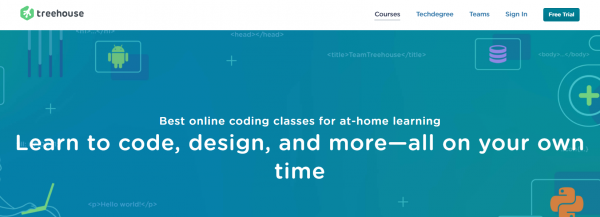
What’s more, Treehouse operates its own video studio, meaning that all of its video content feels very polished and professional. Overall, Treehouse’s production standards are impressive, and the majority of its courses feel very high quality as a result.
Verdict
While Udemy does offer some very high-quality courses, the sheer number of all the courses on the platform and the absence of any strong vetting procedures for instructors means that many of its courses end up being far less impressive. Treehouse, meanwhile, ensures all of its courses have input from experts and are made to high production standards – so it wins in this category.
Noteworthy is Udemy is actually the rarer one here. Zenva, to example, also personally selects every course instructor, makes sure everyone has proper industry experience, and reviews each course. And that’s just one of many.
Course Variety
As well as quality, the variety of different courses on offer is another important factor when it comes to learning to code online. Coding is a diverse, multifaceted field with all sorts of applications, so it’s vital that learning platforms reflect this with courses on a broad range of subjects. Let’s see how Udemy and Treehouse fare when it comes to variety.
Udemy
Course variety is arguably Udemy’s biggest selling point. Since just about anyone can become an instructor and create a course, Udemy has built up a massive range of courses on all manner of subjects. If there’s a subject you want to learn about, chances are you can find a course on it on Udemy, if not multiple.

The drawback is that since Udemy doesn’t do much to curate its content, not every subject is given equal attention. Some courses will have dozens of courses available, while others may only have a handful. Still, the course variety on Udemy is nothing to be sniffed at.
Treehouse
Compared to Udemy, Treehouse has far fewer courses available. Currently, there are just over 300 courses available on Treehouse, as well as 278 workshops. These are split across 23 topics including Android, business, computer science, HTML, and more.
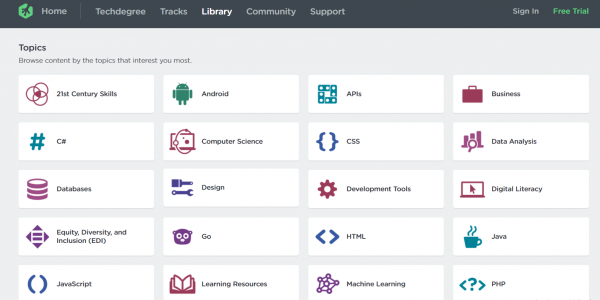
While there are definitely fewer programming courses available, Treehouse still manages to cover an impressive amount of ground. Moreover, it offers a number of different course structures – as well as individual courses – so there are tracks that take you through a number of courses to master a specific skill, and Tech Degrees that give extensive training to prepare for specific careers.
Verdict
While Treehouse does offer a good amount of variety among its courses, its library is undeniably much smaller than that of Udemy. Udemy’s immense course catalog allows learners to find courses on an absolutely huge range of subjects, making it the clear winner here.
This said, this factors immensely into the previous point – quality. It is a trend that smaller catalogs like Zenva let their focus lead to higher-quality content, whereas author Wild Wests like Udemy sacrifice quality assurance for variety.
Price
Another vital factor to consider when choosing an online learning platform is how much it costs, and what exactly you get for your money. After all, no matter how good a platform’s courses are, it won’t be the right choice for you if you can’t actually afford it. How do Udemy and Treehouse stack up when it comes to pricing?
Udemy
Udemy’s paid courses range in price from $10-$100, and once you’ve paid, you get lifetime access to the course and its contents. This means there’s no time pressure to finish a course to avoid paying for renewed access – simply learn at your own pace.
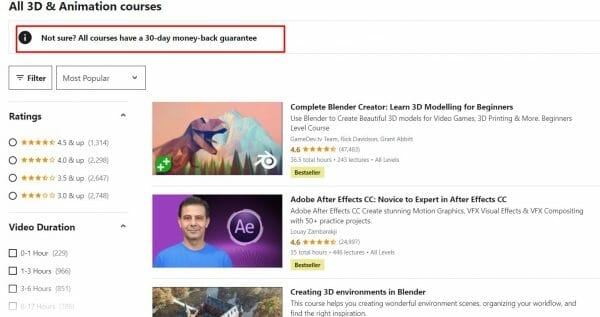
Udemy’s courses also offer a 30-day money-back guarantee as well, which is a helpful addition for those who worry about making the wrong choice on a course and wasting their money.
Treehouse
Unlike Udemy, Treehouse runs on a subscription model rather than charging for individual courses. There are three separate subscription plans: Courses, Courses Plus, and TechDegrees.
The Courses subscription gives access to all of Treehouse’s courses, interactive quizzes, code challenges, and learning tracks for $25 per month. Courses Plus offers all this alongside additional premium content and the ability to download videos for offline viewing, at the higher price of $49 per month.
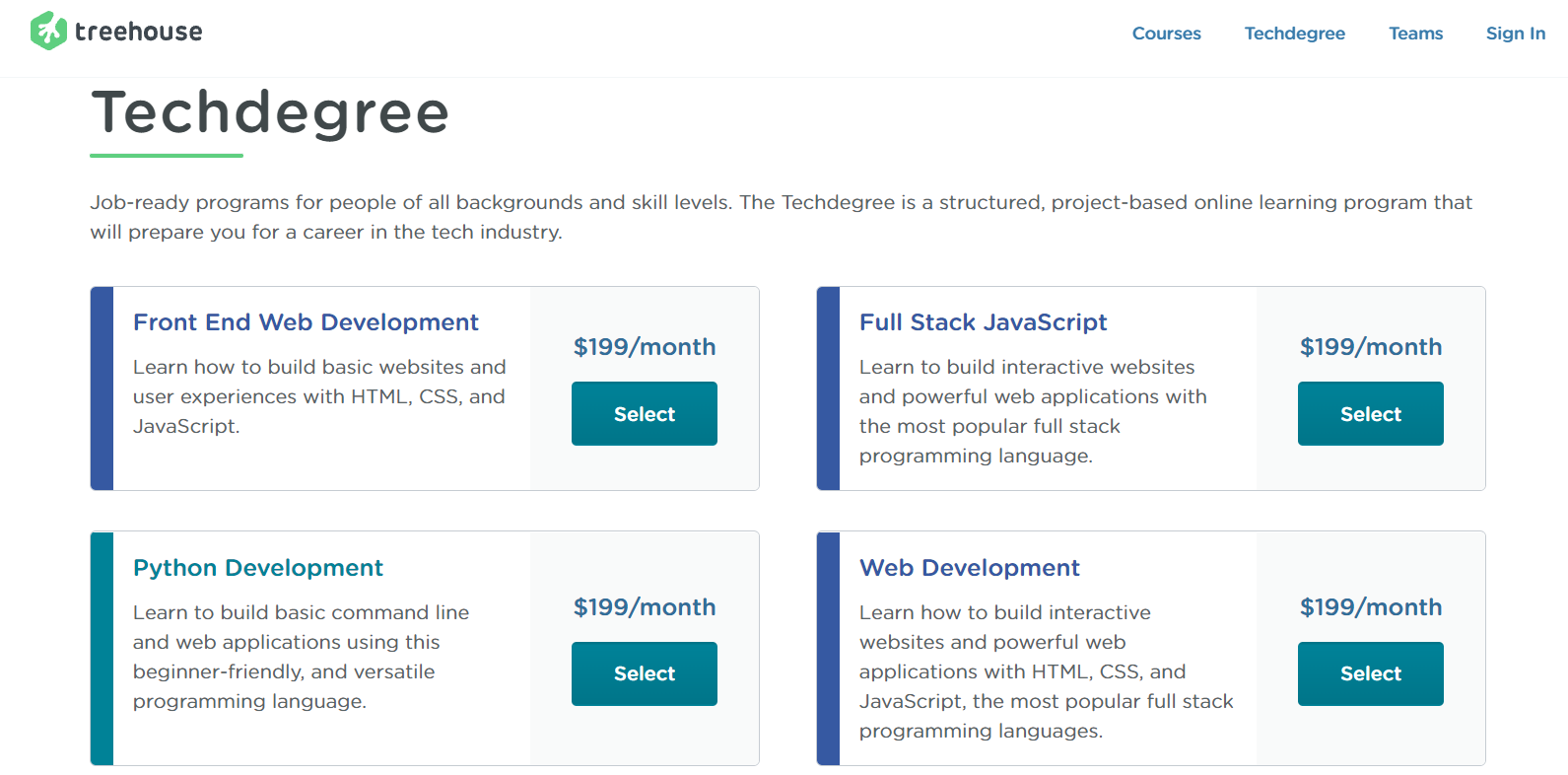
TechDegrees, meanwhile, provide a curated curriculum designed to master the skills for a specific career. They include projects, project reviews, workshops, and a final exam that grants a certificate upon completion. These come at a much steeper price of $199 per month (which includes all Courses and Courses Plus content as well).
Verdict
It’s hard to pick an outright winner here, as Udemy and Treehouse have very different pricing models that both offer good value for money. Udemy offers a large number of highly affordable individual courses, while Treehouse’s subscriptions provide great value for money if you plan on taking several courses per month.
These prices are decently competitive to other platforms like Zenva, so you’ll need to balance this area with other factors.
Instructors
It’s not just the courses that matter – it’s also the people that will be teaching them. Learning isn’t a solo endeavor; you’re likely to need some additional support along the way, so it’s important that learning platforms provide you with this support via their instructors. So, what are the instructors like on Udemy and Treehouse?
Udemy
Udemy’s instructors are very much a mixed bag. Since basically anyone can sign up to Udemy and start making courses, with extremely minimal vetting, there’s no set standard of expertise required for instructors to begin teaching there.
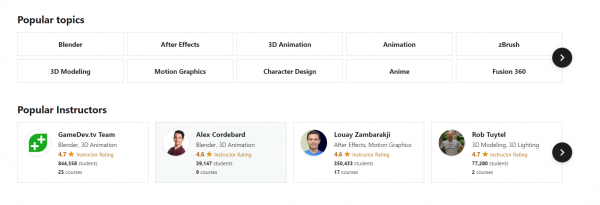
There’s also little guarantee of support from these instructors beyond the courses themselves. Each course does come with a Q&A where learners can ask for advice and clarification, but instructors aren’t necessarily obligated to reply to these questions.
Treehouse
All of Treehouse’s instructors are employed full-time to create courses, aid with content production, and provide support to learners via workshops and the Treehouse Community forum. Treehouse’s instructors are all experts in various fields of technology, meaning they bring real insight to the courses they teach.
Since they take an active role in writing and recording videos, creating exercises, and producing additional content, Treehouse’s instructors are able to bring their expertise to all of the platform’s offerings.
Verdict
While there are definitely some great instructors on Udemy who are proven experts in their field, the lack of vetting procedures means there’s no real guarantee of any specific experience level. Moreover, instructors don’t necessarily provide much support beyond their actual courses.
Treehouse, meanwhile, has a dedicated team of experienced professionals working as instructors, giving them the win in this category.
Other platforms like Zenva also use industry professionals specifically, so Treehouse is among friends. This is yet another area where it can be said quality over quantity is better for courses.
Mobile Usability
Not everyone has a schedule that allows them to learn to code at home or on a desktop; for many learners, studying has to happen on the go. As such, it’s important that learning platforms cater to this need with good mobile functionality. So, what do Udemy and Treehouse offer to mobile learners?
Udemy
Udemy’s website is fully mobile optimized and works well on mobile devices of all shapes and sizes. It also offers a dedicated mobile app with robust functionality, including the ability to download videos for offline playback.

In addition, since each Udemy course comes with lifetime access, there’s no time pressure to complete a course. This can be handy for mobile learners, who are likely to be more pressed for time than those who can learn at home.
Treehouse
Treehouse doesn’t offer a mobile app, but its website is mobile optimized and is easy to use on mobile devices. The downside is that users must be online to complete exercises and quizzes, which may be a problem if your mobile learning happens on a commute with spotty mobile coverage.
Courses Plus subscribers can get around this issue slightly, since they’re able to download videos for offline playback. However, locking this feature behind a higher price tier may sting a bit for learners whose budget is more stretched.
Verdict
Both platforms offer decent mobile experiences, but Udemy comes out on top here by providing a dedicated mobile app with good functionality and the ability to download videos for offline playback – without having to pay for a more expensive subscription.
However, it’s actually becoming rarer to find mobile apps like Udemy’s simply due to regulation changes for the Android and iOS stores and SDKs. So having platforms like Zenva who at least ensure that the site is mobile responsive can be just as good in today’s elearning space.
Professional Development
While many learners may choose to learn to code simply as a hobby or for the transferable skills it helps to develop, others are more focused on the career opportunities it presents.
It’s therefore important that learning platforms provide guidance for learners to help them develop the right skills they need for their desired career. How do Udemy and Treehouse treat professional development?
Udemy
Professional development is one area where Udemy undeniably falls down somewhat. Since Udemy’s model is built around choosing individual courses from a range of instructors, there isn’t much on offer in terms of career guidance or specific learning paths.
It is possible that instructors may offer additional guidance if you ask them, but they aren’t required to help. On the other hand, there are plenty of Udemy courses that focus on creating real-life projects for your portfolio, and each course does grant a certificate for your resume.
Treehouse
In contrast to Udemy, Treehouse excels in professional development. It has an explicit focus on helping to prepare learners for a new career in coding, and its guided learning tracks help you to learn a subject from beginning to end to master specific skills.
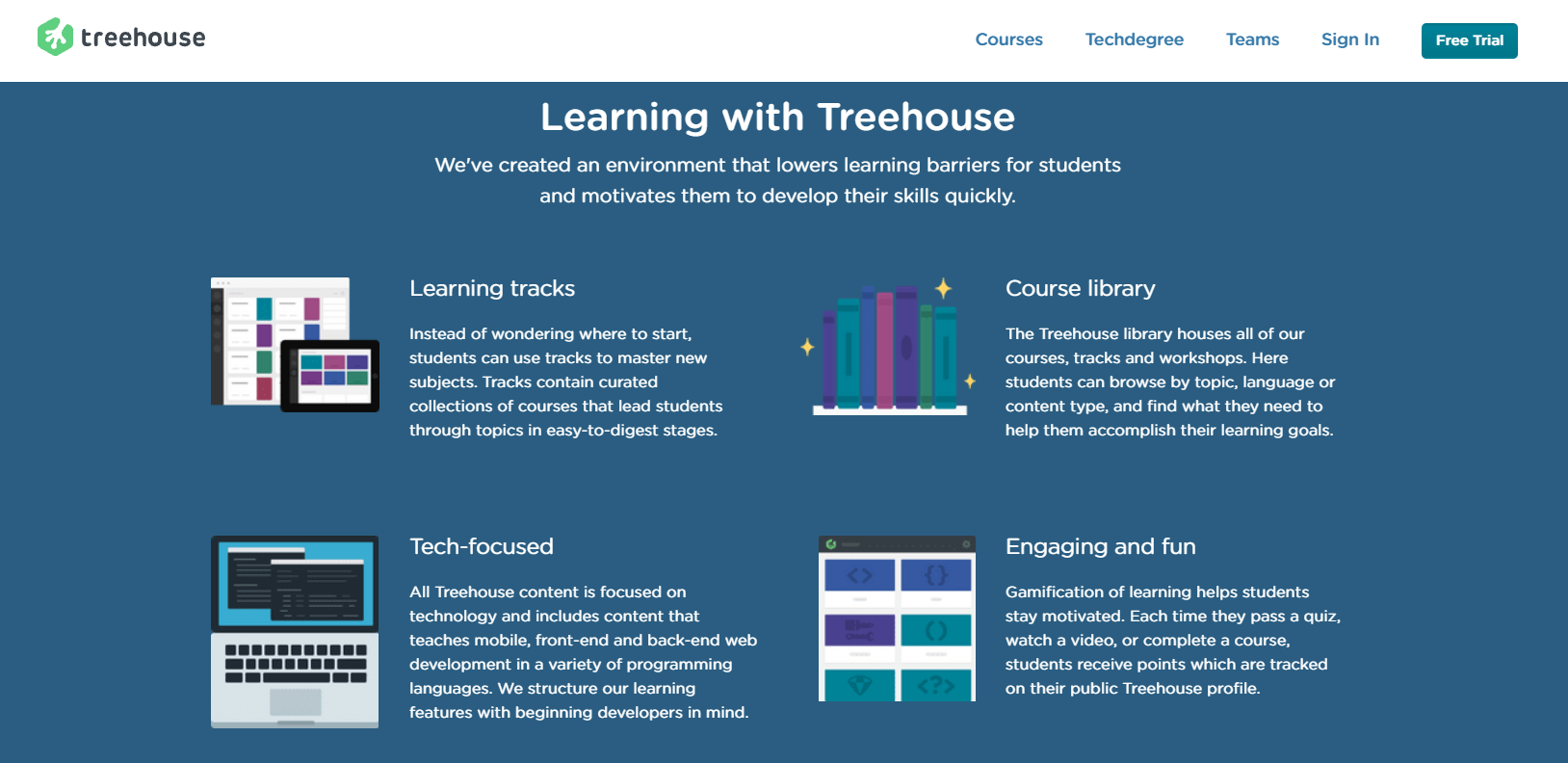
Treehouse’s TechDegrees are the real stars of the show, though. These are comprehensive bootcamps that provide extensive training for specific careers, with workshops, projects, and more all designed to prepare students for a job.
Besides TechDegrees, Treehouse also offers plenty of courses built around creating finished projects like websites, web apps, mobile apps, and more. These can be very helpful for students looking to expand their portfolio to enhance employability.
Verdict
While Udemy shines in many other areas, it fails to offer much in terms of professional development. It may be possible to gain some extra guidance from particular instructors, but don’t count on it.
Treehouse, on the other hand, offers far more guidance and support to learners looking to secure specific careers. In particular, its TechDegrees are a great option for getting job-ready. As such, Treehouse is the clear winner for professional development.
Of course, Treehouse’s services due come with a higher cost – and they may not be needed. Other platforms balance the approach a bit more. Zenva, for instance, is generally cheaper as a whole than Treehouse, but is at least able to offer course mentors to answer course questions and project-based courses to help students build portfolios.
So, do a cost-benefit analysis on this one before you commit.
Final Verdict
While Udemy and Treehouse each have their own specific strengths and weaknesses, overall it’s hard to proclaim a definite winner. In truth, the better option will largely come down to what your specific needs and goals as a budding coding student are.
If you want to pick and choose from a huge range of different subjects without worrying about time constraints, Udemy may be your better choice. Its library of courses is massive, and most of them are also highly affordable, so it’s ideal for dipping your toe into a broad range of topics to find the ones that interest you most.
However, if you want a more guided experience that’s more career-focussed, Treehouse has more to offer you. Their instructors are all experts in their fields, and the course quality is much more consistent across the board than Udemy’s.
Of course, Udemy and Treehouse aren’t your only options. There are many more online learning platforms that provide coding courses, each with its own strengths that may suit your needs better.
Take Zenva, for instance – their subscription offers over 250 courses for just $20 a month, with impressive support for beginners and a variety of learning paths for those seeking to advance in specific careers.
So, even if your heart is set on Udemy or Treehouse, be sure to research your other options before making a final choice. Learning to code is rewarding, but it can also be difficult, so choosing the right platform for you is essential to make the process easier and more enjoyable.
Did you come across any errors in this tutorial? Please let us know by completing this form and we’ll look into it!

FINAL DAYS: Unlock coding courses in Unity, Godot, Unreal, Python and more.







